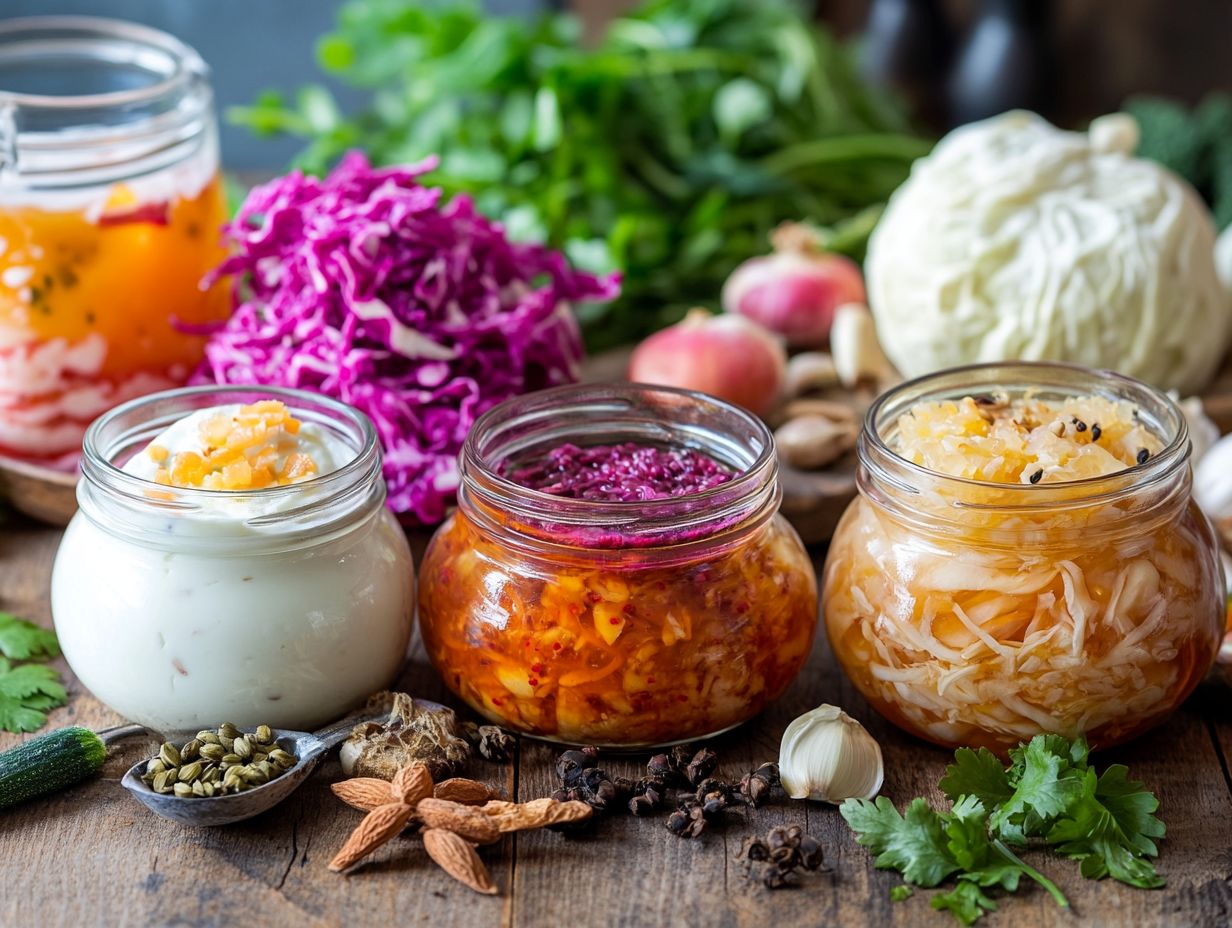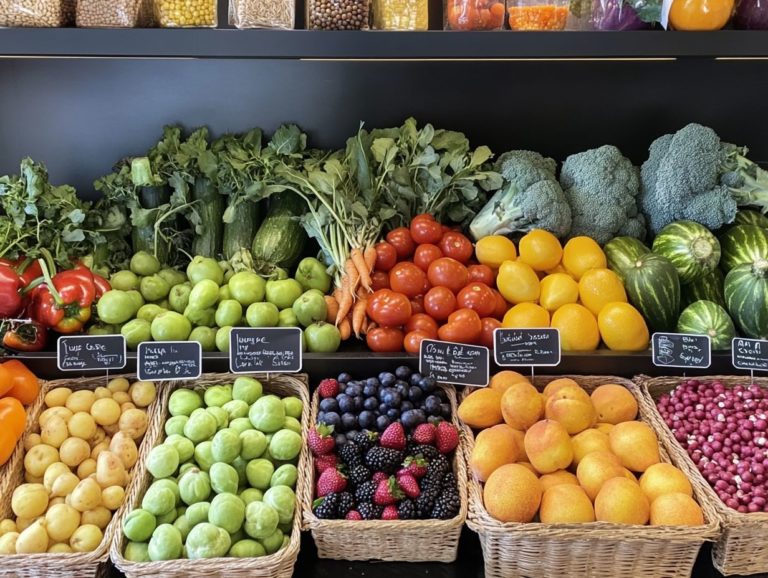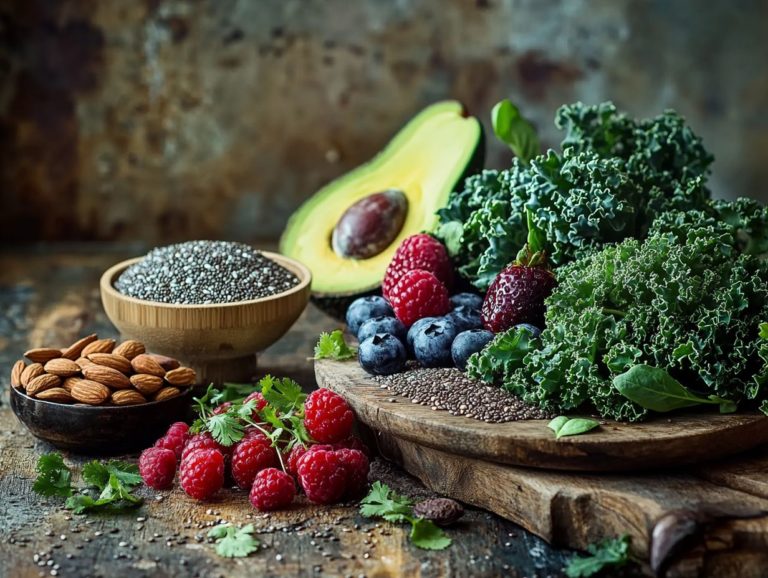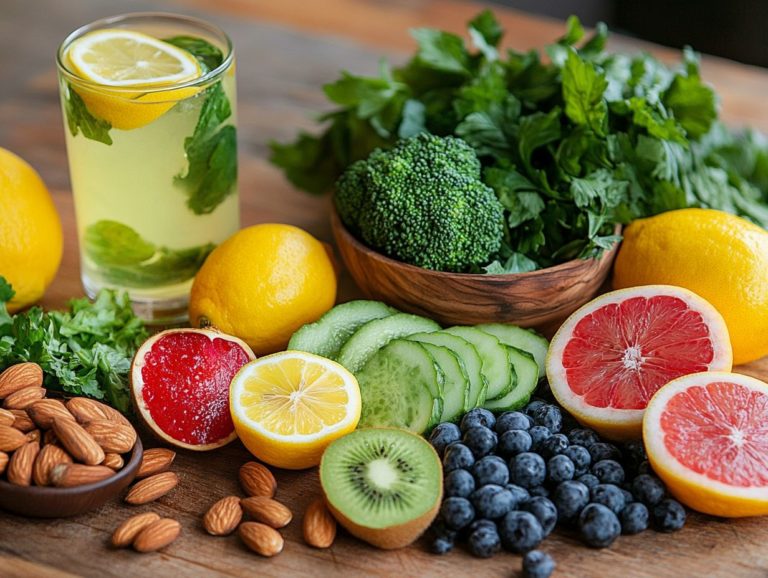How to Incorporate Fermented Foods into Your Diet
Fermented foods have been cherished for centuries, celebrated not only for their distinct flavors but also for their remarkable health benefits.
Get ready to explore a variety of delicious fermented foods that can transform your meals! This article invites you to delve into the captivating process of fermentation, showcasing how it enhances gut health and amplifies nutrient absorption. You’ll receive guidance on seamlessly incorporating these foods into your meals and considering any potential risks involved.
Uncover how these delightful additions can elevate both your diet and overall well-being!
Contents
- Key Takeaways:
- What are Fermented Foods?
- Benefits of Incorporating Fermented Foods
- Types of Fermented Foods
- How to Add Fermented Foods to Your Diet
- Potential Risks and Considerations
- Preguntas Frecuentes
- Qu son los alimentos fermentados y por qu deber a incorporarlos en mi dieta?
- Cu les son algunos ejemplos de alimentos fermentados?
- C mo puedo incorporar alimentos fermentados en mis comidas diarias?
- Existen riesgos potenciales al consumir alimentos fermentados?
- Puedo hacer mis propios alimentos fermentados en casa?
- Con qu frecuencia debo consumir alimentos fermentados?
Key Takeaways:

Include fermented foods in your diet to improve gut health and increase nutrient absorption.
Examples of fermented foods include kimchi, kefir, and sauerkraut.
Incorporate fermented foods by using them as toppings, adding them to salads, or eating them as a side dish. You can also learn how to incorporate herbs into your diet for added flavor and health benefits.
What are Fermented Foods?
Fermented foods are foods that go through a natural process called fermentation, enriching their flavor profiles while offering a wealth of health benefits, especially for your gut and digestion.
These foods are rich in probiotics, which are good bacteria that help your gut. Probiotics play a crucial role in maintaining a balanced gut microbiome, enhancing nutrient absorption, and bolstering your immune system.
You ll find common examples like:
- sauerkraut
- kimchi
- kefir
- kombucha
- miso
- tempeh
- yogurt
All of these are essential players in dietary recommendations aimed at elevating your overall nutrition.
Explanation of the Fermentation Process
The fermentation process is a fascinating journey where sugars transform into acids, gases, or alcohol, all thanks to the hard work of microorganisms think live cultures like bacteria, yeasts, and molds.
These microorganisms thrive in a variety of environments, each playing a unique role in fermentation. For instance, lactic acid bacteria are essential in producing yogurt and sauerkraut by converting lactose and sugars into lactic acid. This not only enhances flavor but also aids in preservation.
Yeasts, such as Saccharomyces cerevisiae, are critical in both bread-making and alcoholic beverages, generating carbon dioxide and ethanol in the process. Traditional preservation methods like pickling and sourdough fermentation have been relied upon for centuries, enhancing food longevity and safety.
Understanding the scientific mechanisms behind fermentation is crucial. Not only does it elevate the nutritional profile of foods through better bioavailability of vitamins and minerals, but it also plays a significant role in improving gut health and overall well-being.
Benefits of Incorporating Fermented Foods
Incorporating fermented foods into your diet unlocks a wealth of health benefits, especially for your gut. Probiotics enhance digestion and nurture your overall microbiome.
These functional foods support nutrient absorption and align beautifully with dietary recommendations for maintaining a healthy weight and boosting your immunity.
Improved Gut Health

Improved gut health stands out as one of the most compelling benefits of incorporating fermented foods into your diet. These foods are naturally abundant in probiotics, which positively impact your gut microbiome, ultimately enhancing your digestive health.
These beneficial microorganisms play a vital role in maintaining a balanced community of bacteria within your gastrointestinal tract, helping to prevent issues such as irritable bowel syndrome and antibiotic-associated diarrhea.
Recent studies featured in esteemed journals like BMJ and Frontiers in Nutrition highlight that regularly consuming fermented foods may reduce your risk of gastrointestinal disorders.
The research reveals that probiotics facilitate digestion and bolster your immune system, resulting in far-reaching health benefits, including improved mental well-being and enhanced nutrient absorption.
Therefore, incorporating fermented foods into your diet can significantly promote your overall well-being. Start incorporating these tasty foods into your meals today for a healthier gut!
Increased Nutrient Absorption
Increased nutrient absorption is a major benefit of fermented foods. The fermentation process makes vitamins and minerals easier for your body to use.
This is especially true for vitamins B and K. Vitamins B and K play vital roles in energy metabolism and blood clotting, respectively.
The dietary fiber present in these foods supports your digestive health by promoting gut motility and supporting good bacteria in your gut.
To elevate the nutritional profile of these ingredients, consider using cooking techniques like steaming or saut ing. These methods help retain more vitamins while enhancing flavors.
By employing these techniques, you can enjoy the many benefits of fermented foods. They will not only delight your palate but also contribute significantly to your overall health.
Types of Fermented Foods
You ll discover a fascinating array of fermented foods, from tangy sauerkraut and spicy kimchi to creamy kefir and effervescent kombucha.
- Miso has robust flavors.
- Tempeh has a hearty texture.
- Yogurt is a classic comfort food.
Each option brings its own unique taste and a host of health benefits. They enrich your diet with diverse probiotics, which are good bacteria that help your gut.
Examples and Uses
Examples of fermented foods like kimchi and sauerkraut can elevate your culinary repertoire. They serve not just as healthy snacks but also as vibrant side dishes that enrich the Mediterranean diet.
These foods do more than tantalize your taste buds; they provide significant health benefits, making them a versatile choice for any meal.
For instance, you can stir kimchi into fried rice for a flavorful twist or use it as a zesty topping on tacos. Sauerkraut pairs beautifully with sandwiches and adds a delightful crunch to salads.
Why not get creative? Try blending sauerkraut into a creamy dressing for a fun twist on coleslaw! For snacking, enjoy these fermented delights alongside whole-grain crackers or fresh veggies. They provide a satisfying dose of probiotics and essential nutrients to keep you energized throughout the day.
How to Add Fermented Foods to Your Diet

Incorporating fermented foods into your diet can be both delightful and enriching.
You’ll find a myriad of options that elevate your meals and promote healthy weight management. They also bolster your digestive health through mindful eating habits.
Tips for Incorporation
To seamlessly add fermented foods to your diet, start with small servings and gradually increase them. Pairing these foods with your meals elevates flavor and amplifies health benefits.
For instance, imagine adding a spoonful of kimchi to your tacos or swirling yogurt into your morning smoothie. These simple additions can effortlessly introduce nutritious options into your everyday dining experience.
As you explore culinary adventures, consider fermenting vegetables at home or experimenting with homemade kombucha for a refreshing twist on your drinks.
For healthy snacking, think about pairing sauerkraut with whole-grain crackers or enjoying kefir-based dips alongside fresh veggies.
Registered dietitians often highlight the significance of variety, so mixing different fermented foods throughout the week can maximize their health benefits while keeping your taste buds engaged.
Potential Risks and Considerations
While fermented foods present many health benefits, it’s crucial to remain mindful of potential risks.
Be aware of possible side effects, allergies, and the sodium content that often accompanies products like kimchi and sauerkraut.
Consider consulting a healthcare professional or dietitian for personalized advice regarding your dietary choices.
Side Effects and Allergies
Some people may experience side effects or allergies when consuming fermented foods. This can lead to digestive discomfort or reactions to certain ingredients.
Common side effects include bloating, gas, and allergic reactions. These are more likely if you are sensitive to soy, dairy, or gluten, which are often found in these products.
Research shows that intolerance to specific components can worsen digestive issues. It’s essential to identify your triggers for a better experience.
A study in the Journal of Gastroenterology highlights the mixed effects of these foods on gut health. While many thrive on them, others may not tolerate them well.
Because of this variability, consulting a healthcare professional for personalized advice is crucial. This is especially important if you have preexisting conditions or allergies.
Preguntas Frecuentes

Qu son los alimentos fermentados y por qu deber a incorporarlos en mi dieta?
Los alimentos fermentados son aquellos que han pasado por un proceso donde las bacterias naturales descomponen az cares y almidones, creando cido l ctico. Este proceso no solo preserva los alimentos, sino que tambi n genera enzimas beneficiosas, probi ticos y vitaminas del grupo B.
Incorporar alimentos fermentados en tu dieta puede mejorar la digesti n, fortalecer tu sistema inmunol gico y promover la salud en general.
Cu les son algunos ejemplos de alimentos fermentados?
Ejemplos comunes de alimentos fermentados incluyen chucrut, kimchi, k fir, yogur, kombucha, tempeh, miso y encurtidos.
Tambi n hay otros alimentos fermentados como pan de masa madre, vegetales fermentados y algunos tipos de queso.
C mo puedo incorporar alimentos fermentados en mis comidas diarias?
Hay muchas formas de incluir alimentos fermentados en tu dieta. Puedes a adir chucrut o kimchi a s ndwiches y ensaladas, usar k fir o yogur en batidos, o como cobertura para avena o granola.
Tambi n puedes incluir miso o tempeh en salteados o sopas. Considera picar vegetales fermentados como encurtidos o disfrutar de kombucha como una bebida refrescante.
Existen riesgos potenciales al consumir alimentos fermentados?
Para la mayor a de las personas, los alimentos fermentados son seguros y ofrecen muchos beneficios para la salud. Sin embargo, si tienes un sistema inmunol gico comprometido o un historial de problemas digestivos, consulta a tu m dico antes de consumir grandes cantidades.
Puedo hacer mis propios alimentos fermentados en casa?
S , muchos alimentos fermentados se pueden preparar en casa con ingredientes y equipos simples. Una b squeda r pida en internet te ofrecer recetas y tutoriales para hacer chucrut, yogur, k fir y m s.
Aseg rate de seguir pautas adecuadas de seguridad y saneamiento para evitar riesgos para la salud.
Con qu frecuencia debo consumir alimentos fermentados?
No hay una recomendaci n espec fica sobre la frecuencia, pero incluir alimentos fermentados en tu dieta unas pocas veces a la semana puede brindarte m ltiples beneficios.
Es importante mantener una dieta equilibrada y variada, as que intenta incorporar diferentes tipos de alimentos fermentados tambi n.






